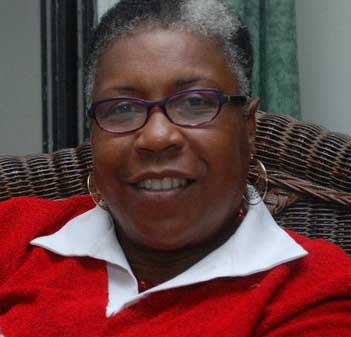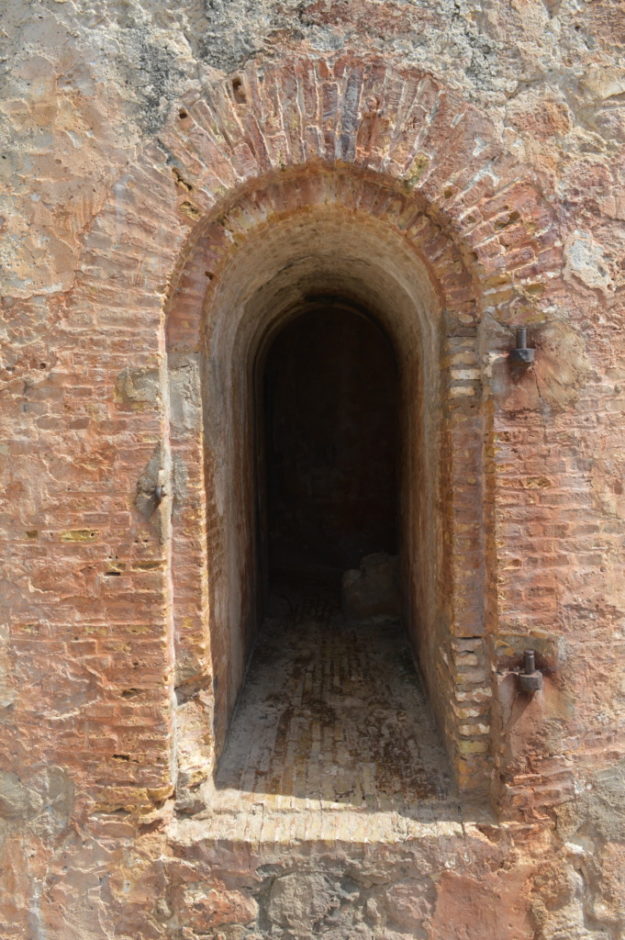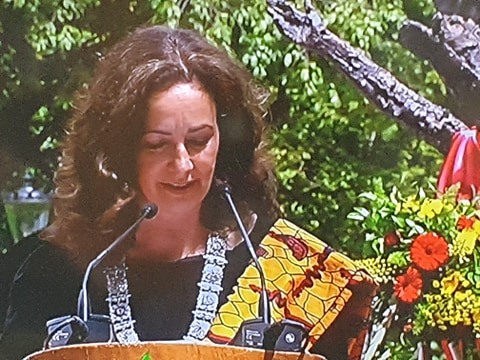Repair: oral history as reparative and the question of reparations
by Nicole Lev
Decolonization requires a full reckoning with the colonial past. One crucial aspect of this reckoning is bringing into view the voices of oppressed peoples that were for so long silenced in the dominant historical narrative. A contemporary focus on oral history has been part of the academic inquiry into the lived experiences of the enslaved and the stories they told about their lives. Oral histories collected from the Dutch Caribbean tell the story of colonialism from the perspective of the enslaved. These voices from the past have a meaningful place in the present.

Repair is at the heart of a post-colonial ethic. Repairing the broken historical narrative. Repairing formerly colonized people by restoring their dignity and humanity. But how can amends be made to the wronged if they are dead? The question of reparations has often seemed unanswerable in part due to the passage of time.
The Netherlands was responsible for 5% of the African slave trade, transporting 600,000 African slaves out of the 12.5 million Africans kidnapped and sold into slavery (Oostindie, 2014). Asian slavery often receives less attention in contemporary discourse about the legacy of Dutch colonialism, but the Dutch East India Company was responsible for Asian slavery in Indonesia (Oostindie, 2014). The story of the Netherlands as a prominent colonial power on the world stage during the 17th, 18th, and 19th centuries cannot be told without slavery and the profits derived from forced labor across all of its colonies. After World War II there was a large postcolonial migration to the Netherlands, and one million out of sixteen million people in the Netherlands today have postcolonial roots (Oostindie, 2014). The Netherlands transformed into a multicultural society without intending to, and post colonial migrants encountered racial and cultural exclusion (Oostindie, 2014).

The Rijksmuseum put on its first exhibition about Dutch colonial slavery in 2021, displaying objects already in their collection and acquiring others in order to tell 10 individual stories of enslaved people. Oral histories were woven into the exhibition, a choice that the curators explained was crucial given that enslaved people were unable to leave written evidence of their perspectives. (Boffey, 2021). The audio guide featured an oral history recording of Ma Chichi, who was born into slavery in 1853. She discusses her grandmother’s life as an enslaved woman in Curaçao, saying that “She never did what the lords wanted”. This centers an often overlooked dimension of the agency seized by the enslaved: resistance took many forms. In the context of this exhibition, 77 gallery texts were added to objects in the permanent collection, so the museum is no longer obscuring or excluding information about the connection between an object and slavery (Siegal, 2021). A striking example are the two portraits by Rembrandt of a wealthy Dutch couple, Marten Soolmans and Oopjen Coopit. The couple’s wealth from the sugar refining business was connected to slavery, as raw sugar came from slave plantations in Brazil (Siegal, 2021). Their economic entanglements with slavery might previously not have figured in a museum caption or audio guide. This painting is a masterfully painted portrait displaying the abundant wealth of the couple, but it also had another story to tell.
Oral History: Abolition Day Songs
Oral tradition is a form of communication in which knowledge, arts, and beliefs are received and transmitted orally from one generation to the next (Allen, 2021). Oral history denotes a method of collecting oral testimony from people who were close enough to historical events to feel their impacts, and is also termed “reparative histories” as they deconstruct colonial historiography (Allen, 2021). Oral history has received more recognition recently for its importance as a historical knowledge source, alongside written sources, in telling the colonial history of the Dutch Caribbean (Allen, 2021).

On the island of Curaçao, the oral tradition is primarily in Papiamentu, an Afro-Caribbean Iberian creole. Academic Rose Mary Allen uses historical analysis and linguistic interpretation to uncover new insights from this oral tradition. Slavery was abolished in the Dutch Caribbean on July 1, 1863. Oral historians have collected many songs that reference this event, showing the cultural significance attached to it in collective memory (Allen, 2021). Some of the songs focus on William III, the monarch in the Netherlands at the time, and reveal the frustration and anger of the enslaved who felt that freedom was being withheld (Allen, 2021). The songs reflect a discontent and anxiety with waiting for abolition, as it was anticipated for many years before it was declared, and the British had abolished slavery in their colonies in 1834 (Allen, 2021). One of the songs collected by Rose Mary Allen conveys the joy former slaves felt after receiving their freedom, while also offering a reflection about feelings of past subjugation:
Kaiman djuku
Djuku kaiman
Mi n’ta laba tayó
Mi n’ ta laba kònchi mas
Mi n’ ta bari kas mas
Mi no ta katibu di shon mas.
No more subjugation
Subjugation no more
I am not doing the dishes
I am not washing any bowls anymore
I am not sweeping the house anymore
I am not the master’s slave anymore.
This song is part of the tambu genre, which was prohibited during slavery (Allen, 2021). Choosing a previously prohibited genre expresses a liberated autonomy (Allen, 2021). The repetition of the negation “I am not” is a powerful verbal act of claiming freedom. The song expresses relief that the burdens of slavery have been lifted. The song suggests freedom is the ability to choose the work that you do, while some of the other songs about Abolition Day express the idea that equality cannot exist without freedom (Allen, 2021). There are many variants of the songs about abolition that have been collected from across the island, and the songs bring an important perspective to the historical record about how people felt and thought about this historical event, and how it was remembered and passed down through generations (Allen, 2021).
These songs are repositories of collective memory, and reveal a history that comes down through the generations through feelings, emotions, attitudes, and values inscribed in what has been preserved (Allen, 2021). Written documents from the colonial period are from the enslaver’s perspective, they have little to say about how the enslaved lived and made sense of their lives. Oral history preserves accounts of subtle resistance, of family bonds and social connection, of longing and striving for freedom. A slave in a master’s ledger might be documented by name, age, and sale price. But how did that individual understand themselves and the other in the colonial relationship of unequal power? How did they self-define, as passive subjects or as agents who took agency where they could? How did they construct meaning in their social life despite or in resistance to the bonds of slavery? Oral history can help tease out answers to these complicated questions.

Foto © Michiel van Kempen
Reparations
In discussions of Dutch involvement in the slave trade, the point is often raised that one cannot be responsible for the crimes or moral failings of one’s ancestors. This strand of the discourse misses the point. The renewed attention to colonial history is not about inculcating personal shame, but rather about ensuring that the stories we tell about history are complete. Yet Dutch society has been slow to relinquish its pride in the narrative of the Golden Age when the Netherlands was prominent on the world stage (Oostindie, 2014). The Dutch have a self perception of being tolerant and progressive which may be why the colonial past sits more uneasily with them (Oostindie, 2014).
Oral histories have the power to repair dominant colonial historiography, bringing in voices that have been silenced. These voices from the past are deeply relevant as Western society continues to deal with the consequences of slavery and colonization. The police murders of Black Americans and the activism of Black Lives Matter has garnered worldwide attention and highlighted the ongoing necessity of dismantling structural racism. Within this global discussion of decolonization and the progress towards racial equality, the Netherlands has its own unique history and challenges.

Apologetic sentiments have become de rigueur. At the UN World Conference on Racism in 2001 a Dutch representative spoke of his government’s “deep remorse” for the slave trade (Howard-Hassman, 2021). The royal family has expressed “deep regret” (Oostindie, 2014). On July 1, 2021, the same day that slavery was abolished in Dutch colonies in 1863, the mayor of Amsterdam offered a formal apology for Amsterdam’s role in the slave trade and said “It is time to embed the great injustice of colonial slavery into the identity of our city, through broad and unconditional recognition” (Schaart, 2021). Yet the Dutch government has so far refused to issue a formal apology for slavery, possibly out of a fear of demands for financial reparations (Oostindie, 2014). There are continuing debates on how to view the colonial past, and far right political parties in the Netherlands believe that apologies for the past are a form of nation shaming (Oostindie, 2014). Prime Minister Rutte has said it could be polarizing to formally apologize; this view is seemingly in line with Dutch citizens, as only 35% think a formal apology is necessary, according to a recent survey (Schaart, 2021). This is an untenable stance in the present day, with no legitimate moral basis.
If expressions of remorse or formal apologies are to be meaningful though, they must be a first step in an ongoing process of reckoning with the past. A fuller accounting of colonial history that includes the traumas of enslavement described in oral histories alongside the precise record-keeping of the Dutch East India Company and Dutch West India Company, which systematically lays out the colonial plundering of Africa and Asia, leads to a question: how can this suffering be atoned for and this theft paid back? The contested issue of reparations to the descendants of slaves is taken up by Ta-Nehisi Coates in his seminal article “The Case for Reparations” in The Atlantic. He points out that people often focus on how reparations would practically work as opposed to the question of their justice (Coates, 2014). In the US, white families have on average 20 times more wealth than black families (Coates, 2014). Reparations would seek to close this wealth gap, but perhaps just as importantly, the national conversation that it would require could begin to heal the traumas of the past (Coates, 2014). Another idea for reparations that Coates describes is “a program of job training and public works that takes racial justice as its mission” (Coates, 2014). While a discussion of reparations may lead to the determination that there is no way to fully repay the descendants of slaves, the discussion is just as much about a country’s “heritage, history, and standing in the world” (Coates, 2014). Coates invokes the example of German reparations to Israel after the Holocaust as a precedent of a nation paying compensation to the victims of a previous government (Coates, 2014). The Dutch rail firm NS made headlines a few years ago with its decision to offer financial reparations for transporting Jewish families to Nazi transit camps, and notably the widowed spouses and the children of survivors are also eligble for the compensation (Karasz, 2019). This is a moral acknowledgment that the trauma inflicted on the deported person extends past the individual to their family. What would reparations in the Netherlands look like? The history of slavery and colonial oppression makes this a topic worthy of serious study and discussion. But the discussion could open with two words, “We apologize”.
References
Allen, R.M. (2021, soon to be published) A Multi-voiced Perspective on Curaçao’s Colonial History Through Traditional Songs.
Boffey, D. (2021) Rijksmuseum slavery exhibition confronts cruelty of Dutch trade. The Guardian. https://www.theguardian.com/world/2021/may/18/rijksmuseum-slavery-exhibition-confronts-cruelty-of-dutch-trade
Coates, T-N (2014) The Case for Reparations. The Atlantic. https://www.theatlantic.com/magazine/archive/2014/06/the-case-for-reparations/361631/
Howard-Hassmann, R. (2021) Why the West is morally bound to offer reparations for slavery. The Conversation. https://theconversation.com/why-the-west-is-morally-bound-to-offer-reparations-for-slavery-153544
Karasz, P. (2019) Dutch Railway Will Pay Millions to Holocaust Survivors. The New York Times. https://www.nytimes.com/2019/06/27/world/europe/ns-dutch-railway-holocaust.html
Oostindie, G. (Eds. Besamusca, E. & Verheul, J.) (2014) Discovering the Dutch: On Culture and Society of the Netherlands. Amsterdam University Press. https://doi.org/10.1017/9789048526093
Schaart, E. (2021) The Netherlands told to apologize for slave trade past. Politico. https://www.politico.eu/article/netherlands-slave-trade-apology-demand/
Siegal, N. (2021) Telling Stories of Slavery, One Person at a Time. The New York Times.
Nikki Lev is a student in the Pre-Master’s program in European Policy at UvA. She has a Bachelor’s degree in English and American Literature from Harvard University.
[Final paper for The Unknown Caribbean: Artistic key moments in Dutch-Caribbean history, UvA, 31 December 2021.]
